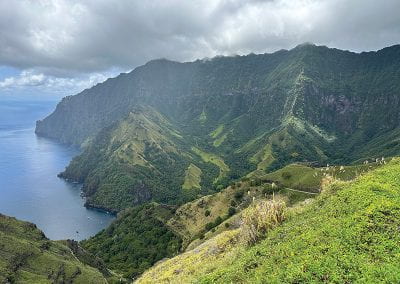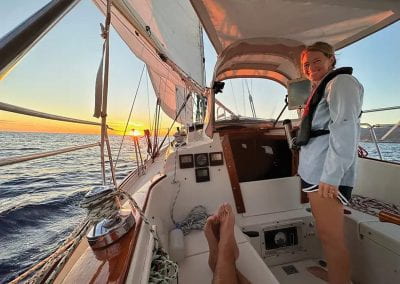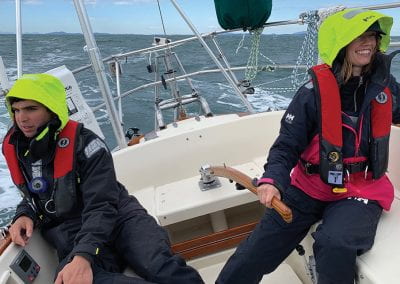
By Shelby Gill / Photos by Katherine Rhoades González
While hiking the remote island of Tahuta in French Polynesia, Katherine Rhoades González (B.S.I.B., magna cum laude, ’10) came across a wild hog. She was “half-tempted to break into a ‘Woo Pig Sooie,’” but thought better of it and quietly found a path to circumvent the 200-pound animal.
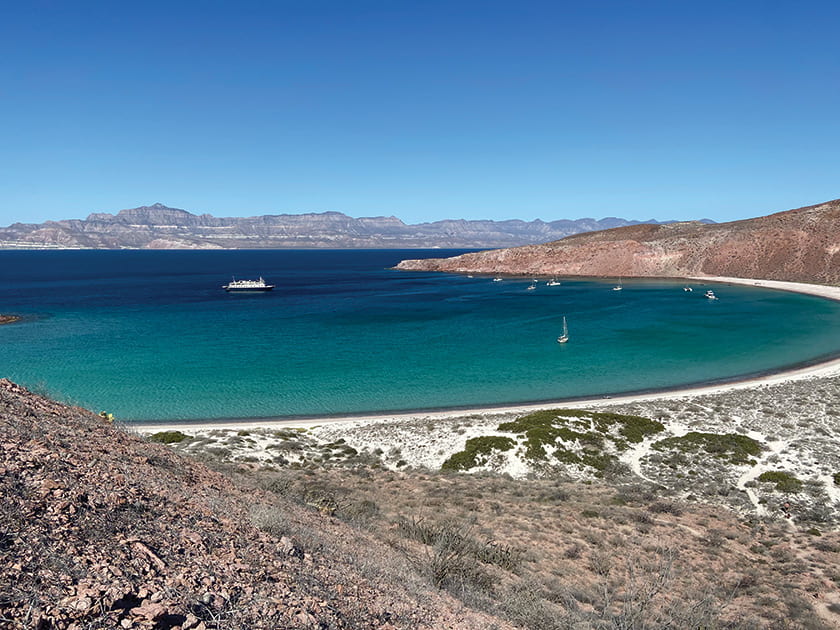
González, who grew up in land-locked Springfield, Missouri, recently sailed 2,700 miles (about the width of the United States) across the Pacific Ocean to French Polynesia from Mexico. The honors alumna began saying yes to adventure when she accepted the Honors College Fellowship at the University of Arkansas.
“Saying yes to one adventure opens the door to the next opportunity,” González reflects. “I said yes to the Honors College even though I didn’t know anyone.”
That “yes,” led her to study abroad in Japan through an Honors College Study Abroad Grant. After graduation, she received the Rotary Ambassadorial Scholarship to move to South Africa, where she studied marketing at the University of Cape Town. When she completed her studies, she was hired by Phillips 66 to negotiate contracts and continued to travel throughout the U.S. and internationally.
Ten years later, González and her husband, Andrés, paused their careers to sail around the world.
“There is a risk in pursuing the dream now, but there’s also a risk in delaying your dreams for retirement,” González said. “My dad worked for 40 years, retired and was diagnosed with Lymphoma months later. We elected to take a risk now rather than risk not having the opportunity to sail.”
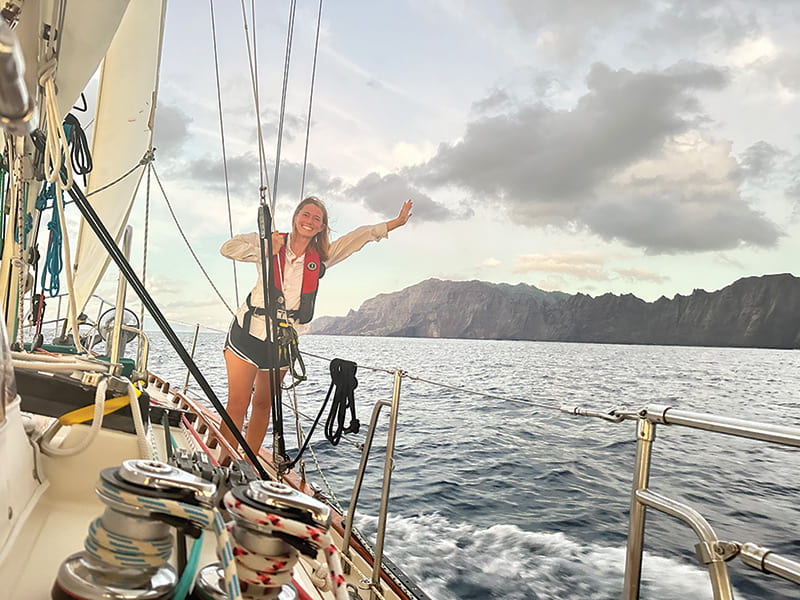
Landfall after crossing the Pacific
Over the course of three years, the couple spent more than a month on the water in U.S. Sailing Certificate Courses, while also transforming a neglected 30-year-old Pacific Seacraft 34 into their dream boat, the Ana María.
González’ travels have led her to amazing experiences, like sailing through “pea soup fog” off the coast of Oregon surrounded by more than 100 whales.
“We found ourselves in the middle of a spectacular ballet,” González remembers. “The whales dancing gracefully — a great spout, the broad back gliding up through the surface of the water, the flukes elegantly raised straight into the air before sliding steeply into the deeper waters.”
But the adventure has not been without its challenges and learning experiences. Because the couple sails in remote areas, self-reliance became a critical skill to keep them on course. They’ve learned to become “amateur diesel mechanics, meteorologists, electricians, navigators, woodworkers, plumbers, chefs and even EMTs.” On the last day of their sail from Washington to San Fransisco, the Ana María rounded the infamous Cape Mendocino when a 15-foot wave slammed into the beam. The wave knocked González down, breaking her leg, and her husband was thrown overboard, saved by his tether. They sailed 100 miles to shore nursing a broken leg and treating hypothermia.
After receiving medical care, the couple was at a crossroads in their journey. Should they give up their dream or work through the trauma and sail again?
González reflected on her time at the University of Arkansas to help her determine the answer.
“In my leadership course with Dr. Don White, he taught us the importance of reflection for a leader,” González begins. “A leader doesn’t grow by experience alone. A leader grows and develops when she reflects on what went well and what didn’t go well.”
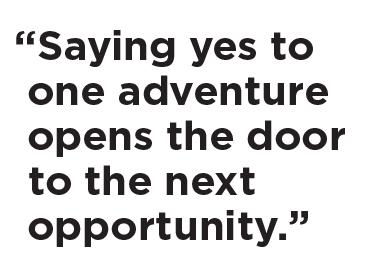
Careful reflection of their experience off the coast of California gave González the confidence to keep sailing. The couple hoisted the spinnaker, sheeted it into position and headed to Mexico before beginning their trek to French Polynesia.
“That exercise revealed that we had done many things right in the incident,” González shares. “While it highlighted what went wrong, it gave us a chance to brainstorm how to prevent it from happening again”
Her international business study abroad program in Japan with Dr. Robert Stapp, clinical professor of economics, also prepared González for her different cultures encountered while sailing.
“Dr. Stapp wasn’t content to let us simply be tourists,” González said. “He taught us how to study a culture and economy, how to ask the questions that lead to understanding and how to appreciate a complex country. I find myself looking at countries through the clear, yet nuanced lens Dr. Stapp gave me all those years ago.”
González details her travels in a monthly newsletter to friends and family and even had the opportunity to share her harrowing experience near Cape Mendocino with Cruising World.
As the saying goes, “Cruisers write their plans in the sand at low tide,” and if the weather cooperates, González is headed toward Tahiti, Bora Bora, the Cook Islands, Tonga and New Zealand before returning to the workforce.
“Say ‘yes’ to the Honors College,” González advises young adventures. “Say ‘yes” to the rigorous course with the tough professor who will push you to excel. Say ‘yes’ to the job not in your hometown. I am on the greatest adventure because I said, ‘yes’ to the opportunities presented to me over the past 15 years.”
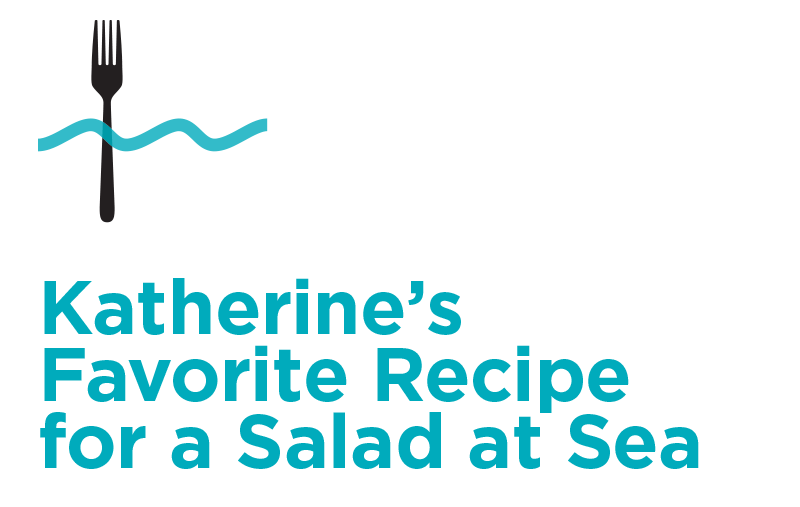

As someone who grew up in Missouri, I eat more saltwater seafood than I have in my entire life! As a sailor who sometimes goes 28 days between grocery stores, we eat more beans than I ever dreamed we would. Here’s a salad recipe we love to eat each month:
If on a boat with limited cooking propane, cook one cup of chickpeas in a thermos. If you’re near land, drain and rinse one can of chickpeas.
Mix chickpeas with diced red bell pepper, finely diced green onion, chopped cucumber and fresh parsley. Flake fresh (cooked) or canned mackerel, jurel, bonito, or other fish, and add to the salad. Add 3 tablespoons of olive oil, the juice of two limes, salt and pepper to taste, and mix well. Serve – preferably on a boat.



